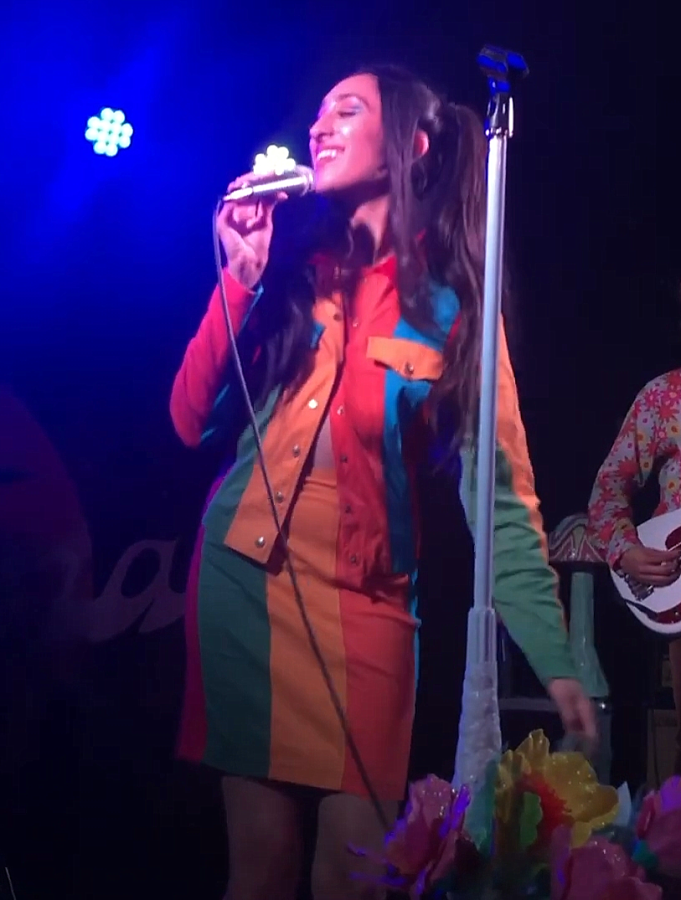New in R&B: Raveena’s Latest Album, “Asha’s Awakening”
Raveena Aurora performing.
January 31, 2022
R&B singer and songwriter, Raveena Aurora, is entering a new era in her music with her latest Bollywood inspired album, “Asha’s Awakening.” With only two songs released at the moment, fans of the 28-year-old Raveena are eager to hear more of this new stage of her music.
Raveena’s music has a distinct feel to it, with her signature soft voice and lulling instrumentals. Her dream-like tone is still apparent in her latest two singles, but now, it is accompanied with a strong Bollywood influence. Raveena calls her new single, Rush, a “more intense marriage between Bollywood sounds and the pop/R&B music.” This marriage is influenced by her childhood love for Bollywood, Jazz, and R&B, claiming that she used to “sing in the bathroom for hours and hours and hours a day” imitating artists such as Ella Fitzgerald, Billie Holiday, and Corinne Billy Ray. Furthermore, her father “was interested in Indian instruments, like harmonium and tabla — we always kept that in the house. They were very connected to music,” she says.
Raveena stresses the importance of having South Asian representation in music, stating “It’s still so rare. There’s always been a really exciting underground movement of Asian artists throughout history, and it’s hard when it’s not validated and seen in the mainstream. My hope as an artist is that I can lift other people up in my community. Because while I feel really honored that people are making space for me, there’s so much space for other types of South Asian voices, and I hope those get heard too… Even if people don’t know what you look like, if they hear a song that is undeniably good, people are gonna want to listen to it.”
“There’s such a big part of South Asian culture that is about being very concerned about what other people think. And I really want to challenge that because I feel fundamentally — as a person, beyond being South Asian — I don’t like to live my life that way… I always feel like a black sheep and an odd one out, no matter what I do,” Raveena says. “So I always want to challenge what I was taught — hopefully inspire others to do the same.”
Throughout her music career, Raveena’s music has been heavily influenced by her queer Indian American identity. She dives into her relationship with her sexuality in her songs. For example, “Headaches” is a dreamy song about a budding relationship between two girls, with Raveena is navigating this new experience. Similarly, “Temptation” is about Raveena’s crush on a girl she dubs “Miss Temptation.” Raveena’s self-directed music video for “Headaches,” follows her and influencer Hitomi Mochizuki play two women falling in love. This genuine representation of a queer relationship between two women is a glass of water amidst the otherwise heteronormative take Western media tends to have. Although the two released songs of her latest album aren’t LGBTQ+ related, many fans hope that Raveena will continue representing her identity within her music.
Raveena also uses her music to navigate her healing journey, especially relating to intergenerational trauma. Raveena reflects upon her relationship with her mother in her song “Mama,” where Raveena asks “I will always wonder who you really were before me. What did you lose? I hope nothing too soon.” She then asks “What kind of tears did you cry on your wedding day?”
Raveena hopes to empower women, including herself, with her music. “As women, we’re often told that our softness, our vulnerability and the things that are really beautiful about being feminine are weaknesses… It’s the ultimate powerful energy that you can embody as a woman. I think that is kind of what my music has been all about for me. It’s been about regaining a sense of power in myself and doing it in a way that feels true to my femininity — because I think a lot of my loss of power was experiencing abuse and assault, which is meant to put women down. Being such a femme person, it was really important for me to tap into that maternal energy and regain the sense of power that was lost.”


